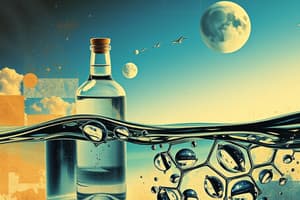Podcast
Questions and Answers
What are the unique properties of water? (Select all that apply)
What are the unique properties of water? (Select all that apply)
- Density of ice is less than liquid water (correct)
- Water is a universal solvent (correct)
- Water has a high surface tension (correct)
- Water can only exist as a liquid
What is meant by water being the universal solvent?
What is meant by water being the universal solvent?
Many substances dissolve in it due to its polarity and hydrogen bonds.
Water molecules are only cohesive, not adhesive.
Water molecules are only cohesive, not adhesive.
False (B)
Why does water have a high level of surface tension?
Why does water have a high level of surface tension?
What does it mean that water has a high heat capacity?
What does it mean that water has a high heat capacity?
The density of water increases when it freezes.
The density of water increases when it freezes.
How does water exist on Earth?
How does water exist on Earth?
What is the role of polarity in water?
What is the role of polarity in water?
What is a hydrogen bond?
What is a hydrogen bond?
What is a covalent bond?
What is a covalent bond?
What characterizes an ionic bond?
What characterizes an ionic bond?
Flashcards are hidden until you start studying
Study Notes
Unique Properties of Water
- Water serves as a universal solvent, capable of dissolving a diverse range of substances.
- Exists in three states in nature: solid (ice), liquid (water), and gas (steam).
- Ice is less dense than liquid water, allowing it to float.
- Exhibits high surface tension due to strong hydrogen bonding between molecules.
- Has a high heat capacity, enabling it to absorb significant heat without changing its state.
Water as the Universal Solvent
- Water's polarity contributes to its ability to dissolve various substances.
- The positive hydrogen ends of water molecules attract negatively charged ions, such as chlorine, while the negative oxygen attracts positively charged ions, like sodium.
- This attraction disrupts ionic bonds, leading to the dissociation of salt into its component ions.
Cohesion and Adhesion of Water Molecules
- Water molecules exhibit cohesion, sticking together through hydrogen bonds.
- Adhesive properties enable water to cling to other polar surfaces, enhancing its role in biological and environmental processes.
Surface Tension of Water
- High surface tension results from water molecules' stronger attraction to each other compared to the attraction between water and air.
- This characteristic allows small objects, like insects, to remain on the water surface without sinking.
Heat Capacity of Water
- The extensive network of hydrogen bonds allows water to absorb substantial heat without altering its chemical state.
- This property plays a crucial role in regulating temperatures in environments and living organisms.
Density of Water and Temperature Relation
- Water's unique hydrogen bond configuration causes it to expand upon freezing, making ice less dense than liquid water.
- This property is vital for aquatic life since ice insulates the water below, preventing it from freezing solid.
States of Water on Earth
- Water naturally exists on Earth in all three phases: solid (ice), liquid (water), and gas (steam).
- Each state plays significant roles in the ecosystem, weather patterns, and climate.
Polarity of Water
- Water molecules consist of two hydrogen atoms and one oxygen atom, forming polar covalent bonds.
- The slight positive charge on the hydrogen atoms and slight negative charge on the oxygen contribute to water's unique properties and its ability to form hydrogen bonds.
Hydrogen Bond
- Hydrogen bonds are electrostatic attractions between polar molecules, particularly significant when hydrogen is bound to highly electronegative atoms like nitrogen, oxygen, or fluorine.
- These bonds are critical for the properties of water and many biological macromolecules.
Covalent Bond
- Covalent bonds involve the sharing of electron pairs between atoms, known as shared or bonding pairs.
- The stability of these bonds arises from a balance of attractive and repulsive forces when atoms share electrons.
Ionic Bond
- Ionic bonds result from the electrostatic attraction between oppositely charged ions, crucial in the formation of ionic compounds.
- Cations are positively charged ions formed by losing electrons, while anions gain electrons, resulting in negative charges.
Studying That Suits You
Use AI to generate personalized quizzes and flashcards to suit your learning preferences.




